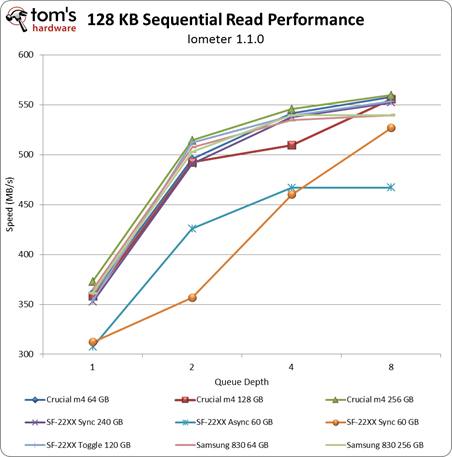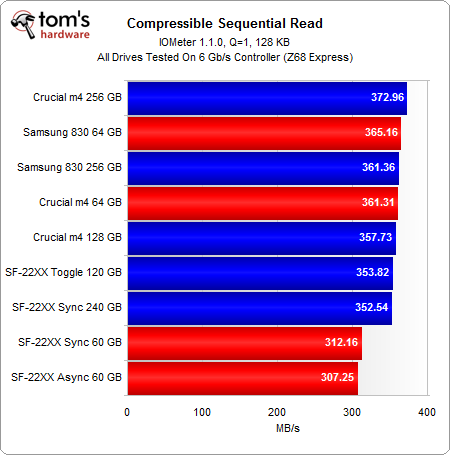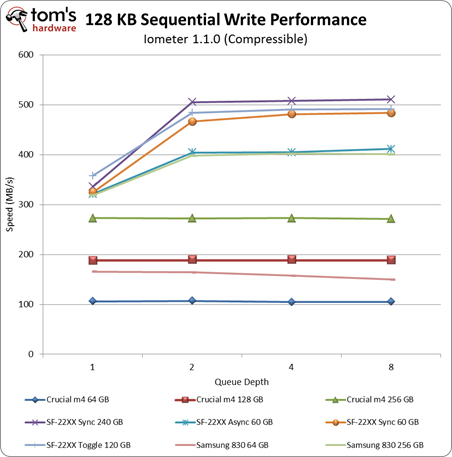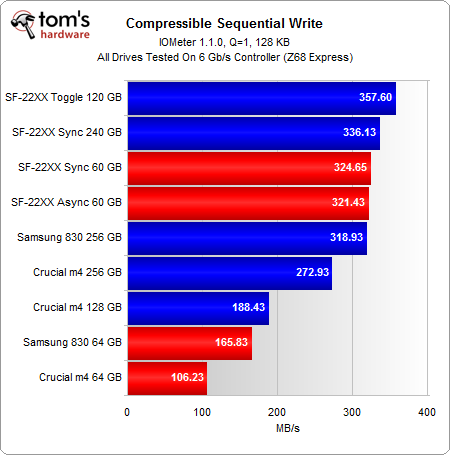60/64 GB SSD Shootout: Crucial, Samsung, And SandForce
Benchmark Results: 128 KB Sequential Performance
Sequential Reads (example tasks: File Copying, Transcoding, Level Loading, Some Gameplay)
In sequential reads, almost all SSDs offer performance between 350-370 MB/s at a queue depth of one, and the competition stays tight at a queue depth as high as eight. The only drives that lag behind are the 60 GB models with second-gen SandForce controllers. Throughput on both starts at close to 310 MB/s and only manages to break through 450 MB/s at a queue depth of four. The 64 GB m4 and 830 both hit those higher numbers at a queue depth as low as two.
Compressible Sequential Writes (example tasks: Some Application Installation, Document Backup)
When you’re dealing with compressible data, SandForce-based SSDs enjoy a particular advantage, since the company’s architecture employs compression under the hood to approach 500 MB/s using a 128 KB transfer size. The results are downright impressive. Even the 60 GB model based on asynchronous memory performs much like the high-end Samsung 830 256 GB.
Crucial’s 64 m4 is the poorest performer here, "puttering along" at 100 MB/s write speeds all the way up to a queue depth of eight. The 64 GB 830 does slightly better, achieving 165 MB/s. But performance actually falls off by 10-20 MB/s as you move up to higher queue depths. Both drives deliver less than half of the performance provided by the 60 GB SandForce-based SSDs.
Get Tom's Hardware's best news and in-depth reviews, straight to your inbox.
Current page: Benchmark Results: 128 KB Sequential Performance
Prev Page Benchmark Results: 4 KB Random Performance Next Page SandForce: Incompressible Performance-
Wow. Absolutely wonderful article. I did second guess my decision on SSD for my next build for a few. But honestly I'm just using it as a boot drive.Reply
-
acku kixofmyg0tWow. Absolutely wonderful article. I did second guess my decision on SSD for my next build for a few. But honestly I'm just using it as a boot drive.Reply
Glad to hear that!
Cheers,
Andrew Ku
TomsHardware.com -
rossi004 Ok, so I have the whole SSD for boot, HDD for storage and less intensive programs, but I have a practicality question:Reply
Is there a way to have files and programs automatically downloaded, installed, and run from the HDD without doing it manually every time if I have the SSD as the base drive?
-
james_1978 rossi004Ok, so I have the whole SSD for boot, HDD for storage and less intensive programs, but I have a practicality question:Is there a way to have files and programs automatically downloaded, installed, and run from the HDD without doing it manually every time if I have the SSD as the base drive?Reply
You can move your personal folders to your HDD (my documents, my music, downloads, ...), so downloads will end up there automaticaly, but programs will go to your C drive (SSD) by default. -
james_1978 james_1978You can move your personal folders to your HDD (my documents, my music, downloads, ...), so downloads will end up there automaticaly, but programs will go to your C drive (SSD) by default.Ok, sorry, but actually you can move your program files by editing the registry:Reply
Moving only user files is far easier nevertheless, just using "move" in the folder properties... -
james_1978 james_1978Ok, sorry, but actually you can move your program files by editing the registry:Moving only user files is far easier nevertheless, just using "move" in the folder properties..."Add an url" didn't quite work for me :-)Reply
http://www.tomshardware.com/forum/6643-63-windows-boot-drive-user-files-program-files-normal -
Soul_keeper nice articleReply
Worth mentioning, plextor PX-M3S are micron based and use toggle nand
I don't think they make a 64GB version however



